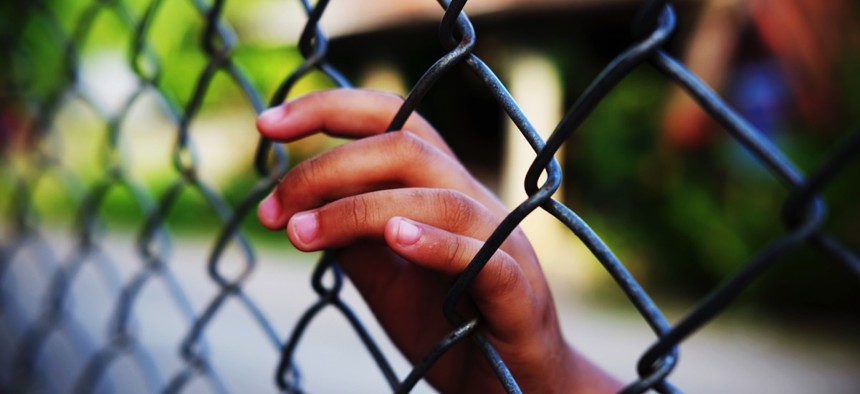Uneven State Juvenile Record Laws Cause Uneven Youth Outcomes

A marijuana possession conviction as a juvenile goes away in Rhode Island but not without a fight in Idaho.
WASHINGTON — States treat juvenile crime records unevenly, which makes it hard for some young people to rebound from even minor offenses and advance their education or find work, according to justice policy experts.
Most youth found guilty of marijuana possession assume they’re finished with their sentence after probation—judges generally even congratulating them—but that’s not true in every state, said Joy Radice, professor and director of clinical programs at the University of Tennessee College of Law.
Rhode Island boasts some of the most robust confidentiality, extinguishing and nondisclosure statutes in the nation, Radice said, but Idaho places convicted youth in a searchable, online database—forcing them to adjudicate sealing or expungement of the record. But on the extinguishing front, Idaho is very effective, she added.
“Every state does this completely differently, and that’s a problem,” Radice said during a Brookings Institute event Wednesday in D.C. “You have this really far-ranging set of state rules from super protected to super exposed online, where you can search it through the rest of the child’s life … and a ton in between.”
Confidentiality statutes might protect everything, with minor exceptions, from becoming public record or require public access, but most states fall in the middle. Some states include additional stipulations like a juvenile record becomes public if the youth is over the age of 17, commits a second offense, or is convicted of a violent crime or sexual assault.
Extinguishing statutes may seal or expunge records, but the nomenclature “is all over the map,” Radice said. Tennessee calls for expungement of juvenile records, but really they’re sealed and filed away.
Non-disclosure statutes exist in only five states, but they’re the “most important,” Radice said. Not only is the state prohibited from revealing anything about the juvenile record, but the youth has the legal right to deny the offense ever occurred on things like job applications.
The District of Columbia keeps juvenile records confidential with the exception of serious offenses like sexual assault.
“Some of them carry the chance of having to register in a registry for 10 years,” said Seema Gajwani, special council for juvenile justice reform in the Office of the Attorney General for D.C.
Juvenile records can be opened by law enforcement and prosecutors if the offender is charged with a crime as an adult, however.
Sometimes youth must formally petition their state’s court system for their record to be extinguished, even having to endure a hearing and present evidence. That typically requires a lawyer, Gajwani said, and in D.C. the prosecutor gets to weigh in.
A state’s extinguishing process should instead be automatic, Radice said.
“Many states … require the juvenile to actually go to court and file some documentation,” Radice said. “The juvenile is somehow—there’s no right to counsel for these hearings—defending themselves and asking for the expungement of the record against a prosecutor who’s representing victims. That to me is absurd.”
Different judges in different counties can respond differently to the same set of charges, adding to the triviality of the process, she added.
Child Trends, a Maryland-based nonprofit researching child welfare, has seen an uptick in judges, prosecutors and defenders using state-level data in their decision making, said Kelly Murphy, deputy program area director for youth development.
“They all talked a lot about how research has informed their thoughts toward diversion, about not detaining youth pretrial, about not incarcerating youth, about the need for different services, and how they don’t want to remove youth and retraumatize them,” Murphy said. “And all of that was clearly articulated, but none of them ever mentioned what happens after youth leave and how the records follow them.”
Juveniles who do enter the justice system are more likely to recidivate, enter the adult criminal justice system, drop out of high school, engage in risky sexual behavior, face unemployment, stay single, and experience poor health outcomes, Gajwani said.
In D.C., disparities in juvenile arrests are evident between ZIP codes and most negatively affect people of color and low-income families. Some schools frequently arrest youth for “very minor” offenses like pouring juice on another student’s head, Gajwani said.
That’s a strong case for making juvenile records go away, Radice said. She advocates for strong confidentiality statutes, sealing juvenile records as soon as the case closes, and expunging them at some point—perhaps at age 18—after which they should be able to legally deny an offense ever occurred.
States sharing juvenile records online at any stage is a bad idea because, once on the internet, that information is easily disseminated and can never be retracted, Radice said.
“Should a state actually share it at some point, then you could easily pass a statute that says you have the onus now to make sure these records are up to date and accurate,” Radice said.
Dave Nyczepir is a News Editor at Route Fifty and is based in Washington, D.C.
NEXT STORY: How a Measles Quarantine Can Lead to Eviction






